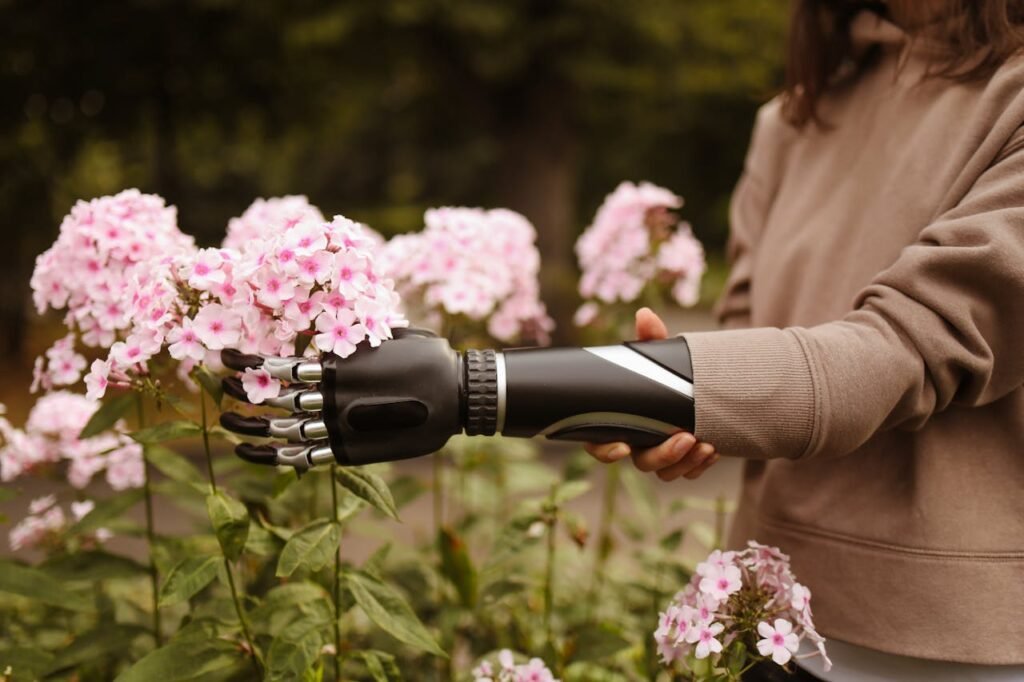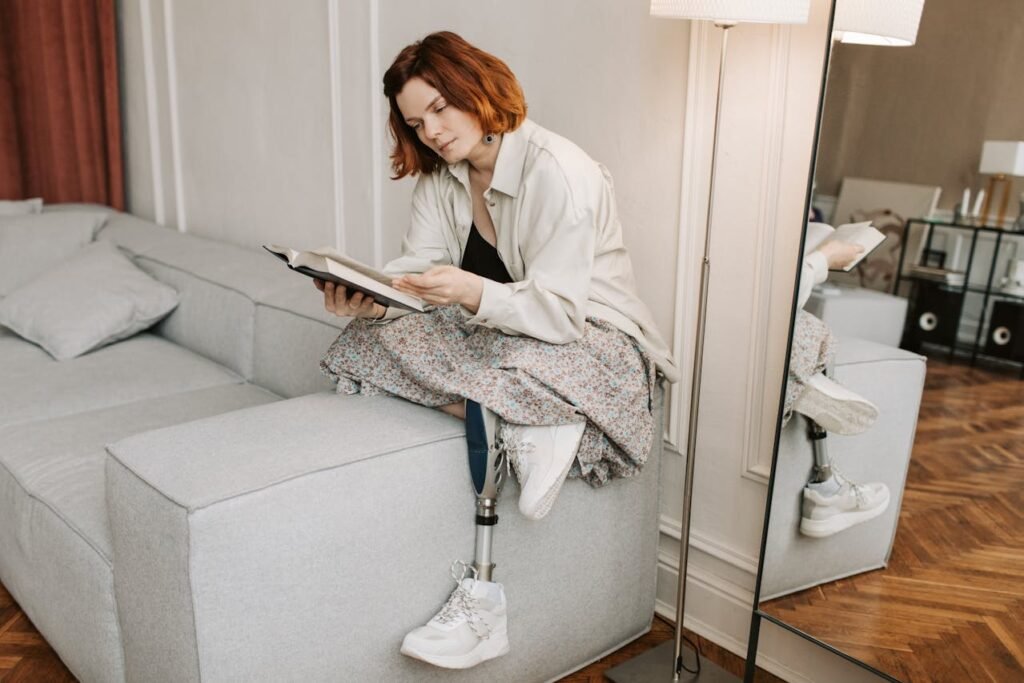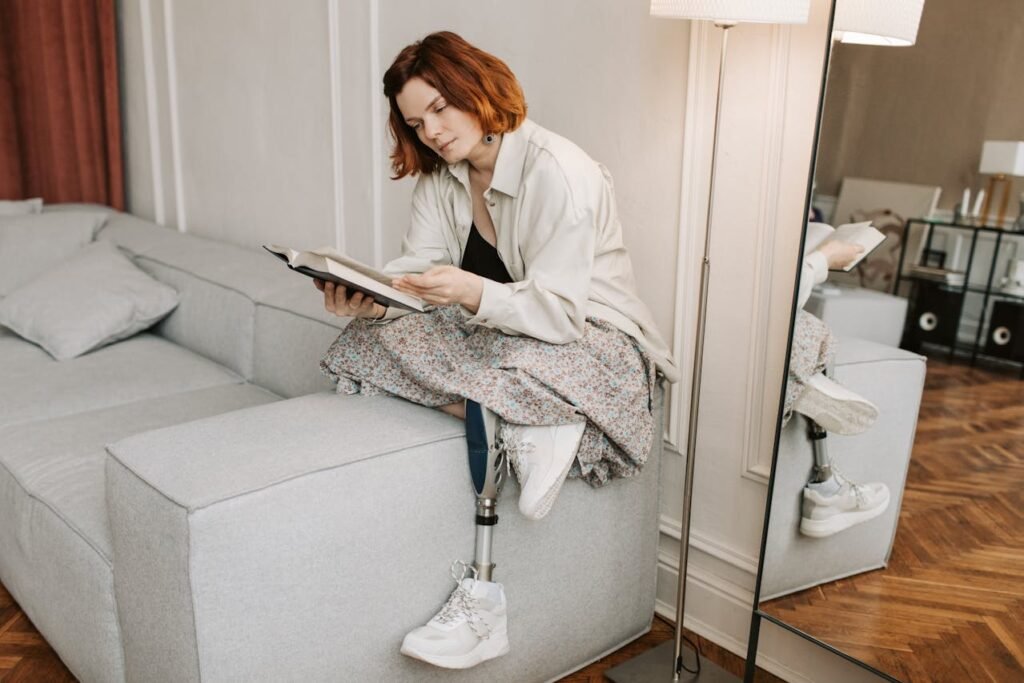Finding the right prosthetist is one of the most important steps in your recovery and rehabilitation journey. For women, that choice goes beyond just technical expertise—it’s about trust, comfort, privacy, and a true understanding of personal needs.
A prosthesis is not just a device; it’s a part of your daily life. The person designing, fitting, and adjusting it plays a key role in how confidently and comfortably you move forward. Yet in India, many women still find the process overwhelming—often unsure about what to ask, what to expect, or how to find a prosthetist who values both function and dignity.
At RoboBionics, we’ve met countless women who’ve shared their experiences—some inspiring, others challenging. Each story reinforces one truth: the right prosthetist can change not just how you walk or work, but how you feel about yourself again.
This guide will help you choose wisely. It will walk you through what to look for in a prosthetist, what questions to ask, and how to ensure your privacy and comfort are always respected. Whether you’re a first-time user or someone upgrading to an advanced prosthetic like Grippy, this article will help you make an informed, confident choice.
Understanding the Role of a Prosthetist
What a Prosthetist Really Does

A prosthetist is a trained professional who designs, fits, and customizes prosthetic limbs. But beyond the technical skills, a good prosthetist understands emotions. They know that losing a limb isn’t just physical—it’s personal.
Their work starts long before the device is made. They listen to your story, study your lifestyle, and learn about your daily routines. Every limb is built differently because every person lives differently.
A prosthetist’s goal isn’t just to make you walk again—it’s to help you move freely, comfortably, and confidently. For women, this means paying attention to how the device fits, how it looks, and how it feels in private moments too.
The Connection Between Comfort and Confidence
A prosthesis that fits well changes everything. It helps you move naturally, carry yourself with ease, and focus on your life instead of discomfort.
For women, comfort includes physical ease and emotional assurance. You should never feel self-conscious or rushed during fittings. The right prosthetist will always take time to make sure you feel at ease—whether you’re adjusting a socket or learning new movements.
If you ever feel pain, pressure, or irritation, that’s not “normal.” A skilled prosthetist will make adjustments until your fit feels just right.
Understanding Fit as a Personal Process
Every woman’s body is unique. Differences in bone structure, muscle tone, and skin sensitivity mean no two fittings are the same.
A thoughtful prosthetist will take time to understand these details. They may use gentle hands to take measurements, soft padding to test comfort, and mirror feedback to check symmetry.
Fit is a journey. The first socket may not feel perfect—but your prosthetist should refine it patiently until it blends seamlessly with your movement.
Prosthetics as a Part of Life, Not a Medical Object
It’s easy to think of prosthetics as medical equipment, but they’re more than that. They become part of your identity—something you live with, work with, and trust daily.
A sensitive prosthetist understands this emotional side. They will speak to you respectfully, explain every step, and never make you feel like just another appointment.
Their job is not only to build a limb but to restore confidence. And that begins with understanding who you are as a person.
The Clinic Environment and Its Importance
Why the Setting Matters
The atmosphere of a clinic says a lot about how you’ll be treated there. A welcoming, clean, and private space shows professionalism and care.
For women, privacy during fittings is essential. Rooms should have curtains or partitions, and staff should always knock before entering. A calm environment helps you relax during sessions that can otherwise feel overwhelming.
Avoid clinics that seem rushed or chaotic. A prosthetic fitting requires time and attention. The best clinics understand that and make you feel valued from the moment you walk in.
Female-Friendly Spaces
A truly women-centric clinic pays attention to details that make you comfortable—female assistants during fittings, separate waiting areas when needed, and respectful communication at all times.
If you feel anxious during early visits, having another woman around—whether a staff member or a friend—can help. Good prosthetists will understand this and make arrangements for your comfort.
Ask whether the clinic employs female prosthetists or technicians. Even if not, they should be trained to maintain professionalism and sensitivity at every step.
Cleanliness and Safety Standards
Cleanliness in a prosthetic clinic isn’t just about appearance—it’s about health. Equipment, fittings, and liners must be sanitized properly after each use.
Pay attention to how the staff handle the materials. Are they using gloves? Are the tools organized and clean? A hygienic environment shows that they value your safety as much as your comfort.
For women, hygiene is particularly important because of skin sensitivity. Clean fittings reduce the risk of infection and irritation around the socket area.
Transparency Builds Trust
The best prosthetists explain what they’re doing as they do it. Whether they’re measuring your limb or testing your socket, they’ll describe every step clearly.
You should never feel left out of your own process. Ask questions freely—about materials, care routines, or future upgrades. A professional prosthetist welcomes your curiosity and answers with patience.
Transparency also includes cost clarity. The clinic should give you a detailed breakdown—consultation, fitting, maintenance, and warranty—so there are no surprises later.
Women-Centric Fit and Design
Understanding Women’s Body Dynamics
Women’s bodies have unique characteristics—so their prosthetics should, too. Differences in muscle tone, fat distribution, and body movement affect how a prosthesis should be designed.
A well-trained prosthetist understands these variations. For instance, the socket’s contour might need a softer edge, or the alignment might differ slightly for balance. These are subtle but essential details that define comfort.
Ignoring these factors can lead to skin discomfort, pressure points, or uneven gait. The right prosthetist will always test your prosthesis in real-life conditions—walking, lifting, or sitting—to ensure balance and grace.
Prioritizing Aesthetics Alongside Function
A prosthesis should empower, not embarrass. For many women, appearance matters just as much as functionality. Whether you want it to look natural, stylish, or match your personal expression—it’s your choice.
Your prosthetist should never dismiss aesthetic preferences as “unnecessary.” From skin tones to finishes, there are many ways to make your device feel personal.
At RoboBionics, for example, many women using the Grippy Bionic Hand have chosen designs that blend elegance with technology. Some opt for a sleek black finish, others for a soft neutral tone. The goal is confidence—because when you like how it looks, you’ll love how it feels.
Comfort During Long Wear
Women often wear their prosthetics for long hours—at work, during travel, or while caring for family. That means comfort isn’t optional; it’s essential.
A good prosthetist ensures that your device doesn’t cause pain or sweating. They’ll test the socket for smoothness, ventilation, and balance. Some prosthetics now use lightweight materials that reduce heat buildup.
You should be able to wear your prosthesis all day without needing constant adjustments. And if discomfort ever arises, your prosthetist should offer quick, respectful solutions—not dismiss it as “normal.”
Weight, Balance, and Movement
A prosthetic’s weight can impact your entire posture. Women, having generally lighter frames, often need devices that balance strength and lightness.
An experienced prosthetist will measure your shoulder or back alignment during fittings to ensure your body isn’t compensating unnecessarily. Proper balance prevents long-term strain and helps you move naturally.
This is where innovation matters. Devices like Grippy are designed to feel light yet strong, allowing smooth motion without extra effort. A good prosthetist will know how to fine-tune these features for your body type.
Privacy, Comfort, and Dignity in Every Appointment
Why Privacy Matters So Deeply

For many women, visiting a prosthetic clinic can bring feelings of vulnerability. Fittings often involve removing clothing from certain areas or being observed during movement. Without privacy, even routine checkups can feel uncomfortable.
That’s why every prosthetic clinic must protect your dignity. Separate fitting rooms, closed doors, and respectful communication are not luxuries—they are basic requirements. You should never feel exposed or hurried during an appointment.
When privacy is prioritized, you relax. You move more freely. You give honest feedback about what feels right or wrong. And that honesty helps your prosthetist build a prosthesis that truly fits your life.
Asking About Privacy Policies
Before choosing a clinic, ask simple but important questions. Are fittings conducted in private rooms? Can a female staff member be present during measurement or testing? Is there a waiting area specifically for women if needed?
These are practical questions that responsible prosthetists expect and welcome. A professional clinic will explain its privacy measures clearly and show you the fitting space before beginning.
If a clinic avoids these questions or dismisses them as “unnecessary,” take it as a sign to look elsewhere. Your comfort and peace of mind should never be compromised.
Comfort in Communication
A good prosthetist listens before they touch any device or tool. They should ask permission before taking measurements, explain what they’re doing, and maintain eye contact—not assumptions.
For women, communication comfort often determines how open they feel about sharing concerns. If something feels uncomfortable, you should be able to say so immediately without hesitation.
Pay attention to how your prosthetist responds. Do they pause and adjust, or brush off your comment? A true professional takes your feedback seriously, no matter how small the issue may seem.
Language also matters. A considerate prosthetist speaks respectfully, avoids technical jargon unless necessary, and checks your understanding at every step. This builds confidence and trust—the two pillars of a healthy prosthetic partnership.
Presence of Female Professionals
Many women feel more comfortable when another woman is involved in their care—especially during measurements or fittings that involve physical adjustments.
A progressive prosthetic clinic recognizes this and employs female staff whenever possible. If that isn’t available, you have every right to request a female chaperone or companion during sessions.
Some advanced clinics in India now have dedicated women’s care teams. These professionals are trained to balance medical precision with empathy and emotional awareness.
At RoboBionics, we’ve found that women users often open up more easily when surrounded by understanding female staff. That trust helps us achieve better fittings and outcomes.
Emotional Safety and Understanding
The emotional side of prosthetic care is often overlooked, but it’s just as vital as the physical. Losing a limb or adjusting to a new prosthesis can bring emotional waves—fear, frustration, or even self-consciousness.
A compassionate prosthetist understands this. They give you time to adapt, never rush decisions, and provide encouragement at every milestone. Emotional safety allows you to build confidence without feeling judged.
If you ever feel anxious, it’s okay to express that. A good prosthetist will listen, reassure, and move at your pace. Healing isn’t just about getting a prosthesis—it’s about regaining comfort in your own skin.
Evaluating Expertise and Specialization
Checking Qualifications and Experience
A prosthetist’s credentials reflect their foundation, but experience defines their skill. Look for someone certified in prosthetic and orthotic sciences from a recognized institute.
Experience matters even more when it comes to women-specific fittings. A prosthetist who has worked with women understands subtle anatomical and emotional nuances that affect design and comfort.
Don’t hesitate to ask about their experience. How many women have they fitted before? Do they have case studies or references? A confident prosthetist will answer proudly and transparently.
Understanding the Types of Prosthetics Offered
Technology in prosthetics is evolving quickly. From mechanical limbs to advanced myoelectric systems like the Grippy Bionic Hand, the range is vast.
Your prosthetist should explain each option clearly—how it works, what maintenance it needs, and how it fits your lifestyle. If you work at a desk, cook at home, or manage both, your prosthetic should adapt to your routine, not the other way around.
Women often benefit from lighter models that balance strength and aesthetics. A well-informed prosthetist will know how to fine-tune these features to suit your needs.
Trial Fittings and Customization
A trustworthy prosthetist never rushes to final fittings. They conduct trials to see how your prosthesis feels in real life—walking, writing, or holding objects.
During these trials, pay close attention to how your prosthetist reacts to your feedback. Do they adjust immediately, take notes, or simply say, “You’ll get used to it”? The right one will refine and recheck until everything feels natural.
Customization goes beyond size. It includes socket shape, material choice, skin tone, and even design preferences. The prosthesis should reflect you—your comfort, your confidence, and your style.
Technology and Innovation
Advanced prosthetics, such as those by RoboBionics, now feature myoelectric control systems that respond to natural muscle signals. A prosthetist trained in these technologies can help you get the best out of your device.
Ask if they’re familiar with newer technologies like tactile feedback or rechargeable systems. The more they know, the more options you have for comfort and mobility.
A modern prosthetist also keeps up with updates—learning about new materials, digital fittings, and 3D scanning for precision design. Choose someone who’s eager to grow, not just repeat old methods.
Long-Term Care and Relationship
Your relationship with your prosthetist doesn’t end after delivery. You’ll need follow-up visits for adjustments, maintenance, and upgrades.
A caring prosthetist stays in touch, checks your comfort after a few weeks, and encourages you to reach out with questions anytime. They don’t vanish after payment—they become part of your support network.
When choosing a prosthetist, look for commitment, not convenience. A long-term partner ensures your prosthesis continues to fit your evolving lifestyle.
Accessibility and Convenience
Location and Travel Ease

Prosthetic fittings require multiple visits. So, accessibility matters. Choose a clinic close enough for easy travel, especially during early fittings.
For women managing work, family, or caregiving, a location within reasonable distance saves stress. If you live in a smaller town, check if the clinic offers teleconsultations or partner centers in nearby cities.
RoboBionics, for instance, partners with prosthetic centers across India to make fittings accessible without long travel. Convenience shouldn’t mean compromise—it should make life easier.
Scheduling and Time Consideration
A professional clinic values your time. Appointments should start on schedule and allow enough time for detailed consultations.
Women often juggle multiple responsibilities, so flexibility is key. A good prosthetist understands this and offers timing options that suit your daily rhythm.
Avoid clinics that rush sessions or cut corners. Fittings take time, and you deserve every minute of that process.
Cost Transparency and Support
Price shouldn’t be a mystery. A prosthetist should give you a clear estimate covering the device, fittings, maintenance, and possible future upgrades.
Some clinics offer payment plans or connect you with NGOs and medical support schemes that help subsidize costs. In India, several government programs assist women with disabilities—your prosthetist should guide you through those options.
Affordable care doesn’t mean lower quality. The best prosthetists find the balance—value without compromising comfort, technology, or dignity.
Post-Fitting Care and Adjustment
The First Few Days After Fitting
Once you receive your prosthesis, the first few days are about learning and adjusting. It may feel unusual at first—your body is adapting to something new. A good prosthetist will guide you patiently through this stage, explaining what’s normal and what’s not.
You might experience mild soreness or tightness as your skin and muscles adapt. But pain, bruising, or redness are warning signs. Contact your prosthetist immediately if these occur. Early corrections prevent long-term discomfort.
Wear your prosthesis for short periods initially, gradually increasing duration as your comfort improves. Remember, your body and mind are both learning new habits. Give them time.
Maintenance and Cleaning
Daily cleaning keeps your prosthesis fresh and your skin healthy. Wipe the socket area gently with a clean, damp cloth after each use, and let it air dry before storing.
Avoid strong chemicals or alcohol-based cleaners—they can damage the material. Use mild soap and water instead. Your prosthetist can recommend products that are safe for your specific device.
If you wear liners or sleeves, wash them regularly. Dry them fully before use to prevent odor or bacterial buildup. A few minutes of daily care can extend the life of your prosthesis by years.
Follow-Up Appointments
Your prosthetist should schedule follow-up visits to check how your limb is adapting. The first adjustment is rarely the last—your body changes slightly as you regain strength and mobility.
These appointments help fine-tune socket fit, joint flexibility, and balance. They’re also a good time to share your experiences—what feels smooth, what feels heavy, or what needs tweaking.
Never skip follow-ups, even if everything feels fine. Small adjustments made early keep you comfortable and prevent future issues.
Handling Repairs and Emergencies
Prosthetics, like any device, can face wear and tear over time. If you notice strange noises, loose parts, or reduced grip strength, don’t try to fix it yourself. Reach out to your prosthetist right away.
A professional clinic should offer maintenance support. They may replace small parts, repair joints, or recalibrate sensors in electronic models. Having an ongoing service relationship ensures quick, safe repairs whenever needed.
For emergencies—like broken straps or electronic glitches—ask your prosthetist for a direct contact or helpline. Knowing help is only a call away gives peace of mind.
Emotional Empowerment After Fitting
Redefining Your Relationship with Your Body

The journey to using a prosthesis is as emotional as it is physical. It’s normal to feel unsure at first—some women describe it as “learning to trust” their body again.
But with every movement you master, confidence returns. The prosthesis becomes part of you, not something separate. Your balance improves, your comfort grows, and your self-image strengthens.
Allow yourself patience. Celebrate small victories—the first time you carry a cup, write smoothly, or simply feel natural again. These moments are milestones in your healing.
Handling Public Reactions
For many women, stepping back into social spaces after getting a prosthesis can be challenging. People may look, ask questions, or offer unwanted sympathy.
The best way to handle this is through self-assurance. When you’re confident in your device and your story, their curiosity fades. You don’t owe anyone explanations, but sharing on your terms can create understanding.
Remember, your prosthetic is a sign of strength. It shows that you’ve adapted, healed, and reclaimed control. You are not defined by what you lost—you are defined by how you rise.
The Importance of Support Networks
Recovery feels lighter when shared. Connect with other women who use prosthetics. Online communities and support groups can offer guidance, empathy, and encouragement.
Hearing real experiences reminds you that challenges are temporary and growth is constant. Many clinics now organize user meetups where women share practical tips—from skincare routines to emotional balance.
If you ever feel discouraged, reach out to these networks. Support doesn’t make you dependent—it makes you resilient.
Mindfulness and Confidence Building
Mindfulness practices like deep breathing, journaling, or meditation can calm nerves and build emotional strength. They help you reconnect with your body and notice progress over time.
Confidence grows slowly, but surely. Every day that you move, work, or live with your prosthesis, you’re proving to yourself how capable you are. Let that awareness fill you with pride.
You’ve adapted to change—and that’s a rare strength worth celebrating daily.
Real Stories, Real Strength
Neha’s Story – Returning to Her Classroom
Neha, a 27-year-old teacher from Pune, lost her hand in a road accident. She was nervous about returning to her students—afraid of their questions and her own discomfort.
When she met her prosthetist, she expressed one simple wish: “I just want to hold a piece of chalk again.” Her prosthetist listened carefully, customized a lightweight prosthetic hand, and helped her practice daily tasks patiently.
Today, Neha teaches full-time. She says, “My prosthetist didn’t just give me a hand; they gave me confidence.”
Her story reminds us that choosing someone who listens can make all the difference between doubt and determination.
Farah’s Story – Finding Comfort and Privacy
Farah, a homemaker from Lucknow, was hesitant about visiting a prosthetic clinic because she feared discomfort during fittings. Privacy was her biggest concern.
Her first experience at a local center wasn’t pleasant—open rooms, male technicians, and rushed appointments. She almost gave up until she discovered a women-friendly clinic partnered with RoboBionics.
This time, she found a female prosthetist who explained every step and respected her boundaries. The difference, Farah says, “was like night and day.”
Her story shows that when women’s privacy and comfort are prioritized, confidence grows naturally.
Priya’s Story – Balancing Work and Motherhood
Priya, an IT professional and mother of two, needed a prosthetic arm that could keep up with her dual responsibilities. Her prosthetist designed a Grippy Bionic Hand tailored for her daily routine—typing, cooking, and caring for her kids.
She describes the process as collaborative. “My prosthetist treated me like a partner, not a patient,” she says. “We designed my lifestyle together.”
Her experience highlights what every woman deserves: a prosthetist who understands life beyond the clinic.
Making the Final Decision
Listening to Your Intuition
Technical details matter, but so does how you feel. If a clinic feels rushed, uncomfortable, or dismissive, it’s probably not the right one. Trust your instincts.
When you meet a prosthetist who genuinely listens, explains clearly, and treats you with respect, you’ll know. That connection makes every step ahead easier.
A prosthetist’s job is to understand your life—not just your limb. Choose the person who makes you feel heard.
Asking the Right Questions
Before finalizing your choice, ask these:
- How many women have you fitted before?
- What privacy measures do you follow during fittings?
- Do you offer female assistants or staff during appointments?
- What kind of post-fitting support do you provide?
- Can I visit for small adjustments without extra fees?
Their answers will tell you everything about their professionalism and care philosophy.
Looking Beyond the Device
A prosthesis is not just a tool—it’s a bridge to independence. But true comfort comes from trust and empathy. The best prosthetist helps you see beyond function and find freedom.
They respect your privacy, your identity, and your pace. They know that every woman’s story is unique—and they shape your prosthetic journey around it.
Why It Matters
Choosing the right prosthetist is about reclaiming control. It’s about walking into a clinic and being treated as a person, not a case. It’s about safety, sensitivity, and shared strength.
For women, especially in India, this decision carries deeper meaning. It’s about being seen, understood, and respected—every step of the way.
At RoboBionics, we design prosthetics that restore ability with dignity. Our Grippy Bionic Hand and Mech series are built for comfort, beauty, and strength—crafted to fit your life, not force you to adjust to them.
If you or someone you know is ready to begin this journey, schedule a free demo at www.robobionics.in/bookdemo. Our team, trained to serve women with sensitivity and respect, will walk with you through every stage—from consultation to confidence.
Because the right prosthetist doesn’t just give you a limb—they help you rediscover yourself.



